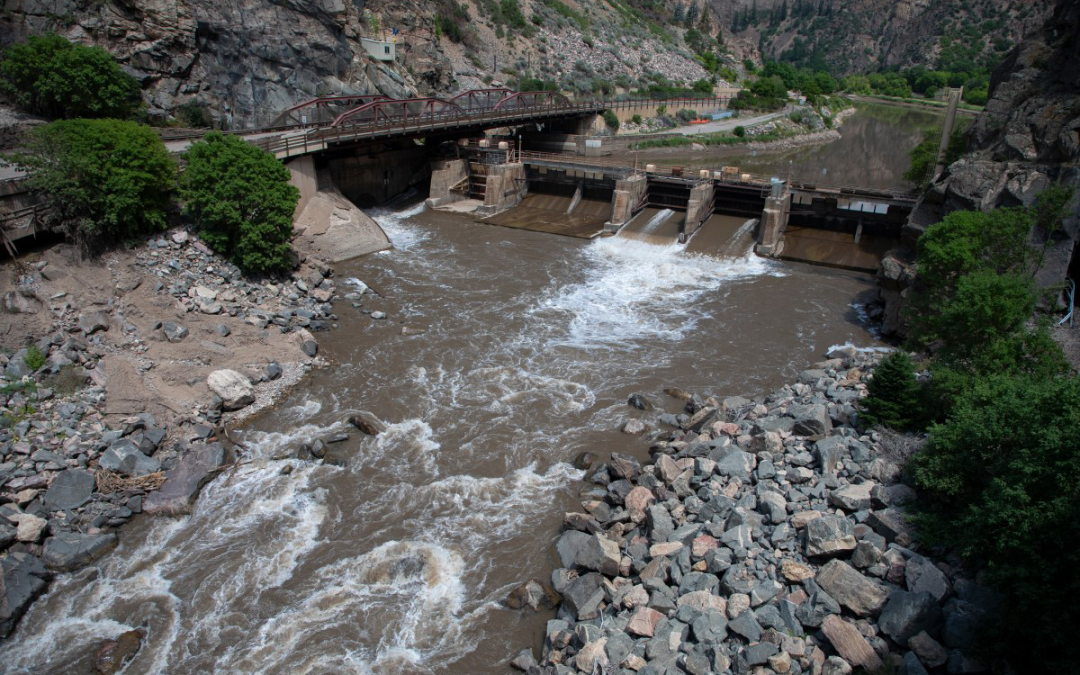The state’s top water policy agency voted unanimously Monday to contribute $20 million toward purchasing Shoshone Power Plant water rights from Xcel Energy.
It’s the latest step in a long process to finalize the deal, which comes with a $98.5 million price tag, and lawmakers still have to approve the expense. Western Slope water leaders — many of whom were at Monday’s meeting — see Shoshone water rights as a linchpin for their future water security in the face of the Colorado River’s unpredictable flows. For them, the Colorado Water Conservation Board’s decision was cause for celebration after decades of effort.
“It’s an incredible milestone to reach today and builds momentum to achieve both the fundraising objectives and ultimately the preservation of the historic Shoshone water right,” Amy Moyer, director of strategic partnerships with the Colorado River Water Conservation District, said after the meeting.
For over a century, the Shoshone water rights have shaped how water flows through the Colorado River and its tributaries, influencing its delivery to Front Range and Western Slope water users.
The power plant, located off Interstate 70 in Glenwood Canyon, has some of the oldest water rights directly on the Colorado River in Colorado. Under water law, this seniority means Shoshone gets its full water supply even in times of shortage.
Because the power plant can demand water year round, and because it returns all of the water it uses to the river, Shoshone has major benefits for the environment and water users farther downstream.
The plant’s senior rights help stabilize water levels in a river system that is prone to unpredictability. Farmers, ranchers and recreation outfitters can make business decisions with more certainty. Critical habitat areas are better for endangered fish species. Downstream cities have better water quality.
These water rights are specific to hydropower production. If the aging power plant were to shut down — or if Xcel Energy decided to sell the rights to another water user — it could significantly change how water flows through the Colorado River and its tributaries in Colorado.
If, for instance, Front Range water providers bought the rights, they could choose to divert more water from the Colorado River Basin. Reservoirs above Shoshone could fill and spill more often while downstream reservoirs might struggle to reach capacity. Water levels downstream of the power plant could be lower, allowing water temperatures to increase and affecting fish populations, according to a Colorado Water Conservation Board staff presentation.
“If the power plant were to cease operations without permanent protection of the water rights to an instream flow, the negative economic and environmental impacts to western Colorado and the entire state would be immediate and profound,” Eagle County Commissioner Kathy Chandler-Henry said while speaking in support of the purchase during the meeting.
In 2023, a coalition of 19 local governments, utility providers and environmental groups joined the Colorado River District to purchase the Shoshone water rights. In December, the river district finalized a historic agreement to purchase the rights — as long as certain conditions are met.
Under the agreement, the Colorado River District would own the rights and lease them back to Xcel for continued hydropower production. If the power plant is not in production, the water associated with the rights would revert to instream flows and remain in the river to benefit the environment, according to the river district.
Since signing the agreement, the river district has focused on coming up with the $98.5 million. The Colorado River District board also allocated $20 million to the purchase, and it plans to raise another $10 million from its Western Slope partners.
With the $20 million commitment from the state water board, the river district plans to request the remainder, about $49 million, from the federal government.
Leading up to the meeting Monday, two state legislators wrote a letter of support for the purchase. Neutralizing opposition to the Shoshone deal was even a bargaining chip in a recent reservoir storage agreement on the Blue River, a tributary of the Colorado River that begins in southern Summit County and flows into Dillon Reservoir.
Nearly 20 Western Slope towns, counties, water providers and others submitted letters to the Colorado Water Conservation Board in support of the deal. They emphasized the importance of the agreement to local tourism, recreation and agricultural economies, as well as environmental efforts and lifestyles on the Western Slope.
Board members said the sale is an example of Colorado’s creativity in addressing water challenges in the face of a drier, less certain future and that it’s a sign of the high price of water.
It’s a big investment for the Colorado River from coffers meant for every region in the state, board member Nathan Coombs said.
“There’s going to be a whole lot of belt-tightening … to make all this happen,” Coombs said.
The funding commitment will be included for consideration in an annual water projects bill in the state legislature this session. It will likely act as a grant, without interest and without requirements to pay it back.
“This particular $20 million does represent an investment on the part of the entire state,” Chair Greg Felt said. “It’s in recognition that we are all connected, especially through the Colorado River, so I do think this is an appropriate investment.”
Fresh Water News was launched in 2018 as an independent, nonpartisan news initiative of Water Education Colorado. Our editorial policy and donor list can be viewed at wateredco.org.



 Print
Print